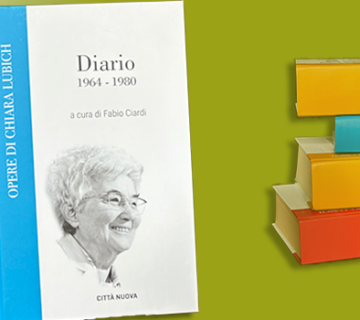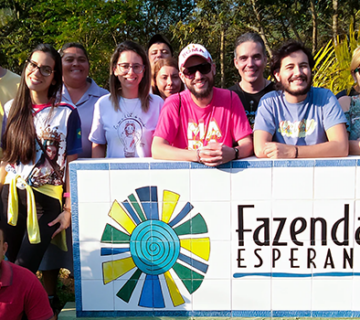 Young people of today, yesterday and tomorrow, and people of every age, on 11 March were in Castel Gandolfo, for an afternoon dedicated, on the fourth anniversary of her death, to Chiara Lubich and the new generations. There were witnesses from the earliest times of the unique rapport that the founder of the Focolare built up with the generation inspired by the protests of ’68 and who had not hesitated to follow her on the path of a different revolution: that of the gospel. Together with her first companions there were those who had never met Chiara personally but who today are working throughout the world to realize the project of universal brotherhood proposed by her charism. They come from places as far apart as Vietnam and Argentina, the United States and Hungary – indeed, in Hungary from 31 August to 2 September there will be the next Genfest, a worldwide youth meeting.
Young people of today, yesterday and tomorrow, and people of every age, on 11 March were in Castel Gandolfo, for an afternoon dedicated, on the fourth anniversary of her death, to Chiara Lubich and the new generations. There were witnesses from the earliest times of the unique rapport that the founder of the Focolare built up with the generation inspired by the protests of ’68 and who had not hesitated to follow her on the path of a different revolution: that of the gospel. Together with her first companions there were those who had never met Chiara personally but who today are working throughout the world to realize the project of universal brotherhood proposed by her charism. They come from places as far apart as Vietnam and Argentina, the United States and Hungary – indeed, in Hungary from 31 August to 2 September there will be the next Genfest, a worldwide youth meeting.
 A message of revolutionary potential was proposed in six scenarios by the young people that afternoon. The first was dedicated to the theme of change, characteristic of the times both then and now. All expressed their gratitude to Chiara – from Valerio Ciprì who gave voice to the longing of the protests in the 70s that inspired the musical group Gen Rosso, to Antonios from Egypt eye-witness to a revolution under way in his country. Among them was Pasquale Ferrara, now a diplomat involved in various peace projects, and Joao Braz Avis, recently made a Cardinal, called to Rome from Brasilia to head the Vatican Congregation for Religious Life.
A message of revolutionary potential was proposed in six scenarios by the young people that afternoon. The first was dedicated to the theme of change, characteristic of the times both then and now. All expressed their gratitude to Chiara – from Valerio Ciprì who gave voice to the longing of the protests in the 70s that inspired the musical group Gen Rosso, to Antonios from Egypt eye-witness to a revolution under way in his country. Among them was Pasquale Ferrara, now a diplomat involved in various peace projects, and Joao Braz Avis, recently made a Cardinal, called to Rome from Brasilia to head the Vatican Congregation for Religious Life.
 Freedom and justice were made concrete by a different way of looking at material goods that, as Chiara herself recalled in one of the numerous videos that were seen (all of them still up-to-date), ‘cannot move of their own accord.’ But giving time and goods is not the only way of ‘building an earthly paradise’ as Chiara urged in the 70s. This was demonstrated by several people. Giuseppe Milan has given a ‘communitarian’ character to courses held by the Science Department of Padua University, where he is head; Emanuele Pili is a student at the Sophia University Insititute, which has set up an interesting cooperation with Emanuele’s original University of Genoa; Patience Molle, an engineer and the first woman to head the Ministry for Public Works in Cameroon, in her administrative activities has respected the law and been faithful to the values that as a young person she imbibed from the Focolare; and Maria Chiara Campodoni at thirty years of age is town councillor with special responsibility for Sport in Faenza, near Ravenna, Italy.
Freedom and justice were made concrete by a different way of looking at material goods that, as Chiara herself recalled in one of the numerous videos that were seen (all of them still up-to-date), ‘cannot move of their own accord.’ But giving time and goods is not the only way of ‘building an earthly paradise’ as Chiara urged in the 70s. This was demonstrated by several people. Giuseppe Milan has given a ‘communitarian’ character to courses held by the Science Department of Padua University, where he is head; Emanuele Pili is a student at the Sophia University Insititute, which has set up an interesting cooperation with Emanuele’s original University of Genoa; Patience Molle, an engineer and the first woman to head the Ministry for Public Works in Cameroon, in her administrative activities has respected the law and been faithful to the values that as a young person she imbibed from the Focolare; and Maria Chiara Campodoni at thirty years of age is town councillor with special responsibility for Sport in Faenza, near Ravenna, Italy.
Another milestone was Chiara’s legacy and the tremendous value of suffering – a starting point for other goals. This was expressed in a moving way by Beppe Porqueddu, who was confined to a wheelchair after a motorbike accident when he was eighteen. He has found that his disability has been a ‘spark of social transformation’ in a world that seems to reject any limitation or illness. Today he is a rehabilitation technician and an instructor for workers in the field of rehabilitation.
Even though it is rooted in the vision of God as love, Chiara’s message is not addressed only to Christians. On the stage there were also Habib, a young Muslim man; Metta, a Buddhist, who observed how this vision helped her to ‘come closer to the truth’; and Andrea ‘a non-believer more than an atheist’, who laid great emphasis upon the welcome and acceptance he had found.
 The afternoon was concluded by Focolare President Maria Voce. She put into light that ‘we have not done an act of remembrance or of celebration, but we have live’ and that Chiara was handing on again ‘here and now’ her message to young people. Young people who are called to welcome it and to put themselves on the line by committing themselves: ‘We owe it to the charism and the humanity.’
The afternoon was concluded by Focolare President Maria Voce. She put into light that ‘we have not done an act of remembrance or of celebration, but we have live’ and that Chiara was handing on again ‘here and now’ her message to young people. Young people who are called to welcome it and to put themselves on the line by committing themselves: ‘We owe it to the charism and the humanity.’
12-03-2012 by Chiara Andreola – Source: Città Nuova


 Italiano
Italiano Español
Español Français
Français Português
Português


